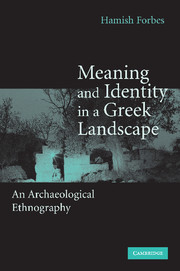Book contents
- Frontmatter
- Contents
- List of Illustrations and Tables
- Preface and Acknowledgements
- Transliteration Conventions
- 1 Introduction
- 2 Landscape Studies: From Frame-and-Tame to Visceral Feeling
- 3 Historical Background to the Landscape of Methana
- 4 Conducting Fieldwork on Methana
- 5 Kinship, Marriage and the Transmission of Names and Property
- 6 The Productive Landscape
- 7 The Historical Landscape: Memory, Monumentality and Time-Depth
- 8 The Kinship Landscape
- 9 The Religious Landscape
- 10 Conclusions: A Greek Landscape from Within
- Glossary
- Notes
- References
- Index
6 - The Productive Landscape
Published online by Cambridge University Press: 04 May 2010
- Frontmatter
- Contents
- List of Illustrations and Tables
- Preface and Acknowledgements
- Transliteration Conventions
- 1 Introduction
- 2 Landscape Studies: From Frame-and-Tame to Visceral Feeling
- 3 Historical Background to the Landscape of Methana
- 4 Conducting Fieldwork on Methana
- 5 Kinship, Marriage and the Transmission of Names and Property
- 6 The Productive Landscape
- 7 The Historical Landscape: Memory, Monumentality and Time-Depth
- 8 The Kinship Landscape
- 9 The Religious Landscape
- 10 Conclusions: A Greek Landscape from Within
- Glossary
- Notes
- References
- Index
Summary
Me shidet të hamë (may we eat with health).
(Saying at the end of threshing wheat)INTRODUCTION
This chapter discusses how settlements may be viewed within their landscapes as both historical and especially economic artefacts. In so doing, it views the situation as though through a series of increasingly powerful lenses. Initially scrutinising the patterning of all the ‘traditional’ communities within the peninsular landmass and the reasons for their placing, it continues by discussing how individual villages fitted within their own sectors of the productive landscape, focusing first on the community as an undifferentiated whole and then on its constituent households. Finally, at its most detailed level, it considers individual plots and the polysemy of their meanings for their owners.
Underlying much of the discussion is the issue of humans as rational decision makers and actors, as seen through archaeological, geographical and cultural anthropological approaches. In all these disciplines, humans are assumed to be rational animals. The difficulty lies in the existence of more than one kind of ‘rationality’. Within social-cultural anthropology, there is a further issue of differences between the ‘rationality’ of the people being described and the author's ‘rationality’. For archaeologists, the foundations of their discipline are inherently materialistic. Not surprisingly, therefore, much of archaeologists' thinking concerning human behaviour is also materialist in one way or another. It has a strong focus on economic behaviour and how humans make a living, often involving the application of energy-efficiency models.
- Type
- Chapter
- Information
- Meaning and Identity in a Greek LandscapeAn Archaeological Ethnography, pp. 177 - 206Publisher: Cambridge University PressPrint publication year: 2007

